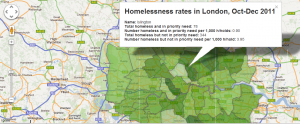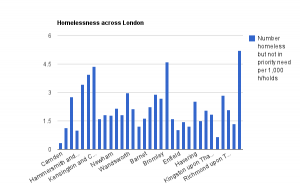At City University, we have spent the past three weeks running a local news service for Islington. Along with door knocking and vox popping, data was an endless source of stories – from car parking charges to pregnancy rates.
But while the data is easy to find – a local authority breakdown of statistics is normally available in supplementary tables – the story isn’t always obvious.
Having heard councillors warn that Islington’s homeless population has grown rapidly out of control, we looked at the newly released national homelessness statistics to see how it compared with other London boroughs.
But on first glance, Islington appeared to have low levels of homelessness. In terms of the numbers accepted as being homeless and in priority need it rated 19th worst out of 33 boroughs.
When we looked at the total number of “non-priority” homeless people the figures were more shocking – Islington had the 6th highest in London. And, after we factored in the size of Islington – which is far smaller than other boroughs – we found Islington had the fourth highest rate, per 1,000 households.
The exercise proved data journalism isn’t just for the nationals – and that by examining statistics from a local perspective, journalists can make more sense of the numbers.


